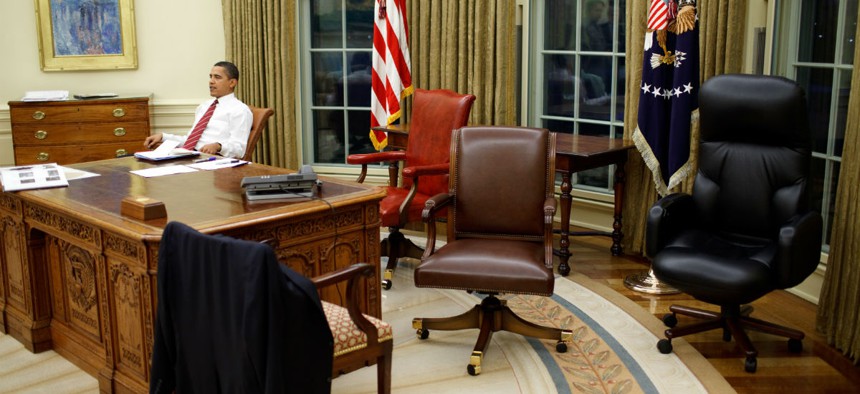
President Obama tries out different office chairs soon after being sworn in as President in 2009. White House Photo by Pete Souza
Senators Want to Smooth the Next President’s Transition to Power
Bill would require agency liaisons and training for political appointees.
Sixteen months before the next president begins assembling his or her governing team, two senators on Thursday unveiled legislation to improve the transition process, tapping expertise of career civil servants and underlining the need for bipartisan cooperation.
The Presidential Transitions Improvements Act (S. 1172) “would ensure that a senior-level, White House-led interagency transition council is in place at least six months before Election Day, and that a standing, working-level interagency group will develop an integrated strategy for transitions,” said a release from Sen. Ron Johnson, R-Wis., and Tom Carper, D-Del., the chairman and ranking member, respectively, of the Homeland Security and Governmental Affairs Committee.
The bill would clarify the transition duties of the General Services Administration, which is responsible for providing office support and space to the major candidates, and requires the administration to name a career employee as Federal Transition Coordinator.
Each agency would tap a senior career official in each component and subcomponent to oversee transition activities at least six months before Election Day. Additionally, they would designate individuals not later than September 15 of a presidential election year to serve in an acting capacity in senior political positions during a transition.
The bill would also expand training available to incoming presidential appointees.
Presidential transitions—particularly when the winning party changes—have long been problematic because of mistrust and fear among campaign planners of being seen months before Election Day as “measuring the drapes of the Oval Office” before a single vote has been cast. As a result, once the votes are in, many nominations have been delayed, and political appointees with little training arrive at agencies unprepared to get them up to speed.
“When a new president takes the oath of office, the new administration must be as prepared as possible to hit the ground running from day one,” Carper said. “Given the challenges facing our country, both at home and abroad, Congress has a critical responsibility to help ensure an orderly transition from one administration to the next.”
Added Johnson, “Regardless of what party wins an election and takes the White House, it is imperative that the transition of power is as smooth as possible. Handing over the keys to the entire $3.5 trillion federal government is a colossal undertaking.”
The bill, which would modernize the 1963 Presidential Transition Act, was influenced by a study by the nonprofit Partnership for Public Service. Its president and CEO Max Stier, whose team is preparing a “road map” for the next transition, urged lawmakers to pass the bill, saying it would “improve knowledge sharing between the outgoing administration and the incoming president’s team, ensure agencies are adequately prepared for leadership vacancies and provide accountability for transition activities across the federal government.”







